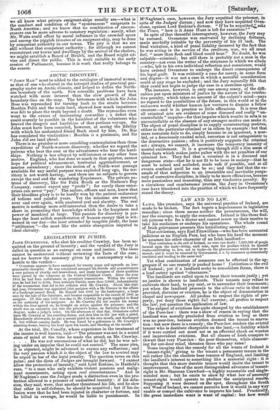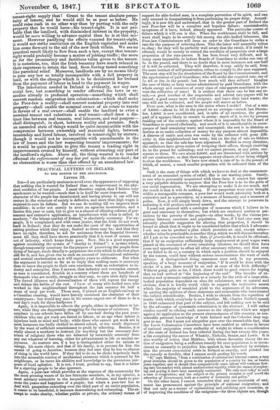LAW AND NO LAW.
Laws, like promises, says the universal practice of Ireland, are made to be broken. The fact begets a hopelessness in legislative remedies ; since there seems neither the perseverance, the will, nor the courage, to apply the remedies. Ireland is like those fool- ish persons who fee a doctor and cannot screw up their resolve to take his medicines or undergo his operations. The whole round of Irish grievances presents this humiliating anomaly.
That cottierism, says Earl Fitzwilliam—who has been accounted judicious as an English Peer, but who loses his head the moment he assumes his other character of an Irish landlord— "That cottierism is the evil of Ireland, no man can doubt: 7,000,000 of people located upon the land—living, each man, upon the produce which he himself rears—cultivating to live, not to trade—is the Rhmoomenon which must be re- moved; and it must be removed by Government, a. e. by measures systematically combined and tending to the same end."
Yet what combination of measures can be effectual in the ag- gregate if no one remedy is pushed home ? Cottierism is the evil of Ireland ; yet if a landlord seeks to consolidate farms, there is a loud outcry against "clearances." The landlords are called upon to treat their tenants justly ; yet no justice is shown to landlords. Their tenants may refuse to cultivate their land, to pay rent, or to surrender their tenements; yet when the landlord proceeds to the anima ratio in that case provided, distraint or eviction, he is the object of denunciation in chapel and newspaper. All profess to respect the rights of pro- perty, yet deny those rights full exercise; all profess to respect the law, yet question the application of law. The subject of evictions has quite changed by the establishment of the Poor-law : there was a show of reason in saying that the landlord was morally precluded from eviction so long as there was no poor-law, because eviction doomed the tenant to starva- tion: but now there is a remedy ; the Poor-law renders the evicted tenant who is destitute chargeable on the land,—a liability which if it were carried out must act as an effectual check on wanton and improvident evictions. But all classes of Irish conspire to thwart that very Poor-law : the poor themselves, while clamour- ing for out-door relief, threaten those who pay rates!
Some imagine that the remedy for all the wants of Ireland is " tenant-right," giving to the tenant a permanent tenure in the soil rather like the obsolete base tenures of England, and limiting the landlord's interest to something like a manorial right : it is thought that this more durable tenure would incite the tenant to improvement. One of the most distinguished advocates of tenant- right is Mr. Sharman Crawford—a highly reasonable and single- minded man ; but he omits to show by what law of necessity tenant-right would operate to produce the anticipated results. Supposing it were decreed on the spot, throughout the South and West of Ireland, we cannot perceive how it would in any way enable or compel the cultivator to improve his land. Practically, the great immediate want is want of capital : but how would tenant-right supply that Grant to the tenant absolute perpe- tuity of tenure' and be would still be as poor as before. He could raise cash in no other way than by parting with the only property that he would have—his tenant-right. It is not pro- bable that the landlord, with diminished interest in the property, would be more willing to advance capital than he is at this mo- ment. However pacifying the effects vaunted for tenant-right, it would not strike conviction on the English capitalist and make him come forward to the aid of the new Irish villein. We see no practical result likely to flow from such a law, except that tenant- right would probably become a matter of jobbing traffic ; the more so for the prominency and factitious value given to the tenure. It is notorious, too, that the Irish tenantry have much relaxed in their eagerness to retain the land, from having tasted something like parochial relief. Moreover, landlords are by no means likely to pass any law so totally incompatible with a full property in land, or with the change which is to be desiderated for Ireland from the payment of labour in land to the payment in wages. The innovation needed in Ireland is evidently, not any new social law, but something to render effectual the laws or re- medies already in professed operation—something which shall convert random emigration into colonization—which shall make the Poor-law a reality—shall convert nominal property into real property—shall enable the nominal owner of an estate to vacate in favour of a real owner—shall enable the landlord to evict a nominal tenant and substitute a real tenant—shall draw a dis- tinct line between real tenants, real labourers, and real paupers— shall distinguish, in short, between reality and pretence. Such an amended state of things would be quite incompatible with the compromise between ownership and manorial rights, between tenantship and hired labour, involved in tenant-right by statute; though it would not be incompatible with amendments in the law of leases and the law respecting tenants' improvements; for it would be quite possible to give the tenant a trading right in improvements created by himself, without alienating any part of
i
the landlord's rights. Above all, the thing wanted s to render effectual the oztoreernent of any lam put upon the statute-book; for no obstruction is worse than that offered by an unenforced law.



























 Previous page
Previous page